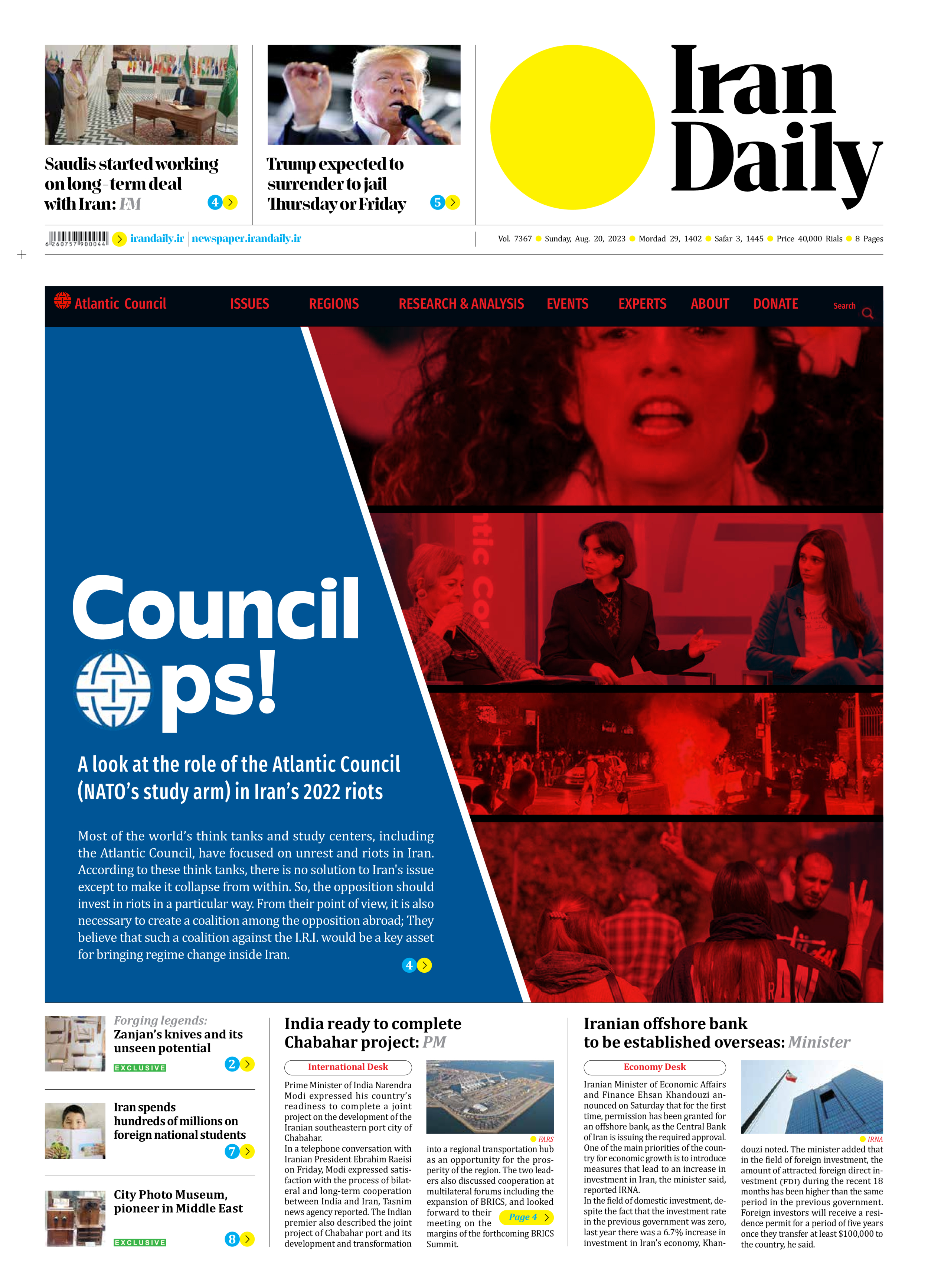
Council ps!
A look at the role of the Atlantic Council
Most of the world’s think tanks and study centers, including the Atlantic Council, have focused on unrest and riots in Iran. According to these think tanks, there is no solution to Iran's issue except to make it collapse from within. So, the opposition should invest in riots in a particular way. From their point of view, it is also
necessary to create a coalition among the opposition abroad; They believe that such a coalition against the I.R.I. would be a key asset for bringing regime change inside Iran.
(NATO’s study arm) in Iran’s 2022 riots
Seventy years have passed since a coup took place in Iran, staged with the help of the United States, Britain, and the Iranian army under the leadership of the Shah. The coup led to the downfall of Mohammad Mossadegh’s national government. Even now, after all this time, there are uncertainties about whether the US and Britain have stopped their practice of interfering in the internal affairs of other nations, especially Iran.
Now, with the recent release of CIA documents and the admissions from US politicians like Richard Nixon, Madeleine Albright, Bill Clinton, Barack Obama, and Bernie Sanders, there is no longer any doubt about their role in toppling the Iranian government. It is evident that both the US and Britain played a significant part in this incident. Just recently, David Owen, Britain’s former secretary of state for foreign and commonwealth affairs, mentioned in an interview with The Guardian that the United Kingdom should acknowledge its leading role in overthrowing Mossadegh.
The coup stands as a clear instance of direct interference by the US and Britain in Iran’s internal matters. The event’s bitterness still lingers in the historical memory of Iranians even after 70 years, significantly impacting the quality of relations between Iran and these states.
The protest against the Pahlavi regime’s heavy reliance on America was a major driving force behind the 1979Islamic Revolution in Iran. Despite acknowledging their role in the coup, the Americans have never truly ceased their meddling in Iran’s affairs or their attempts to interfere. They have even more openly pursued efforts to topple the Islamic Republic, particularly during certain moments like internal protests within Iran.
A recent example is the Americans’ backing of street protests in Iran last year, sparked by the tragic death of Mahsa Amini. Evidence suggests that US officials’ stances aren’t mere spontaneous reactions but rather align with strategic policies formulated within American think tanks, crafted with specific objectives and serving as a roadmap for their effective intervention in Iran’s affairs.
One of the prominent American think tanks is the Atlantic Council, which, in its most recent report, serves as an operational blueprint for the US administration on how to back the opposition of the Islamic Republic and provide recommendations to Iranian opposition groups for regime change amid the backdrop of internal protests in Iran.
Founded in 1961 following the establishment of the North Atlantic Treaty Organization (NATO), the Atlantic Council initially aimed to promote cooperation between the US and Europe, with a focus on economy. It’s no surprise that this think tank is often referred to as an offshoot of NATO. However, over the course of several decades, the scope of its activities has expanded, now spanning across a variety of domains including politics, diplomacy, security and defense, trade and environment, social matters, technology, and its geographical reach has transcended the US and Europe.
It seems that the central theme driving the activities of this think tank, in line with its initial objectives, is the advocacy for democracy and Western values, as well as the preservation of Western hegemony or the unipolar order centered on the United States. Given this perspective, it’s natural that such a think tank would engage closely with models of governance that differ from its own, such as the independent system of the Islamic Republic of Iran. Consequently, it’s not surprising that the Atlantic Council is involved in devising plans aimed at influencing or intervening in Iran’s internal affairs, with the ultimate goal of regime change.
The council’s latest report places its focus on fomenting unrest and strategies to fuel riots in Iran, under the premise that the country would ultimately crumble from within. The report emphasizes the need to support and facilitate the formation of a coalition of opponents to the Islamic Republic of Iran, operating from abroad. It also suggests ramping up sanctions against Iran concurrently, with the aim of pressuring its people to withdraw support for the establishment due to mounting economic strains.
As an instance, the report lauds the formation of a coalition by certain Iranian opposition figures in the previous year, like Reza Pahlavi, Masih Alinejad, Nazanin Boniadi, Shirin Ebadi, Ali Karimi, Golshifteh Farahani, Hamed Esmaeilion, and Abdollah Mehtadi. This is deemed by the council as a significant stride forward in the arduous journey of bringing change to Iran. Furthermore, the report suggests exerting pressure on the international community to back Iran’s protests.
The Atlantic Council also advises that, for success within Iran, parallels from Arab countries should be drawn upon, citing the Sudanese case as an example. In Sudan, the protests were fueled by various sectors, including lawyers, medics, teachers, journalists, and even bus and truck drivers. Consequently, the report advocates for a greater focus on workers’ rights, as it could encourage hesitant elements to join the “revolutionary movement”.
Seven decades following the 1953 coup, there is no indications of reparation from the United States and Britain, but rather, unmistakable signs persist that both nations continue to contemplate meddling in Iran’s matters. The Atlantic Council’s report is just a single instance of these signals, even though the fake coalition endorsed by the think tank dissolved much sooner than anticipated.







